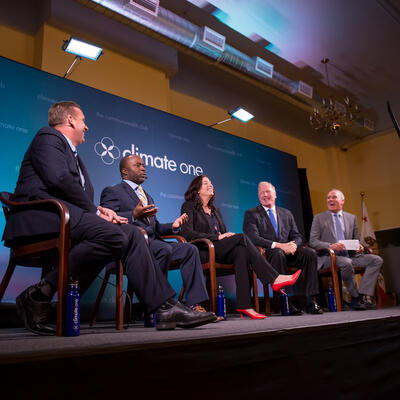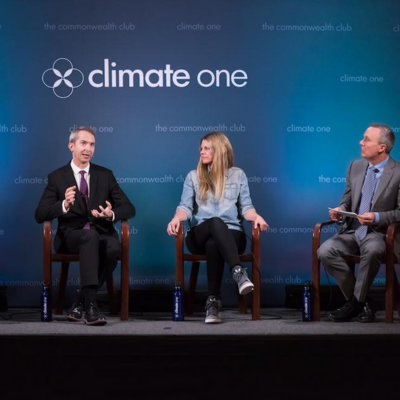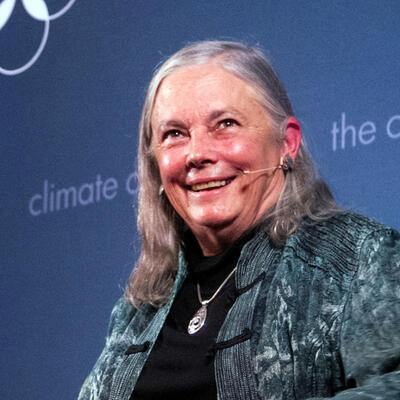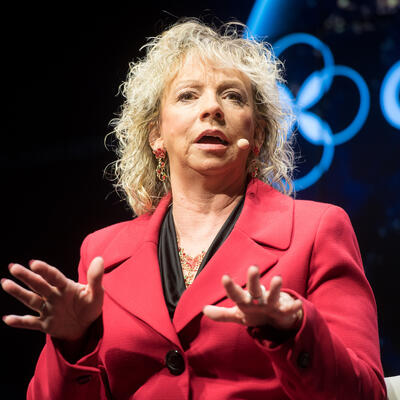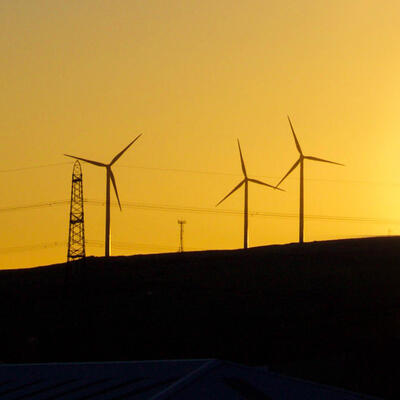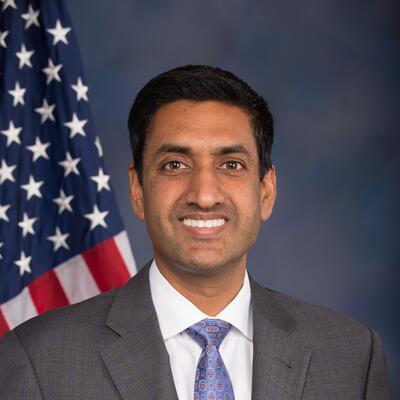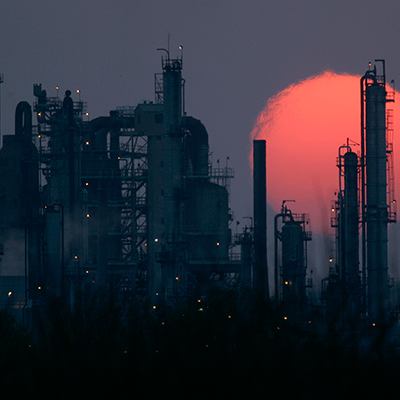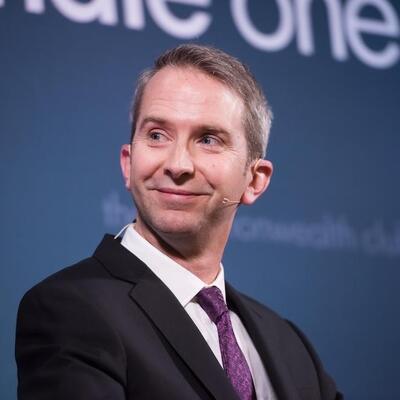
C1 Revue: Political and Climate Disruption
Guests

Christine Pelosi
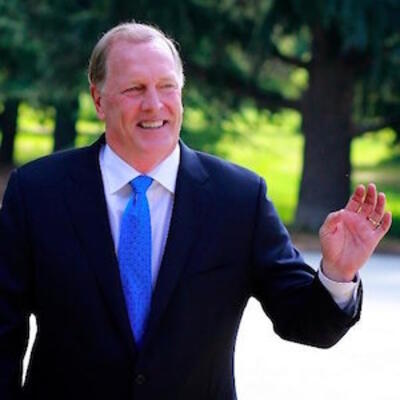
Duf Sundheim
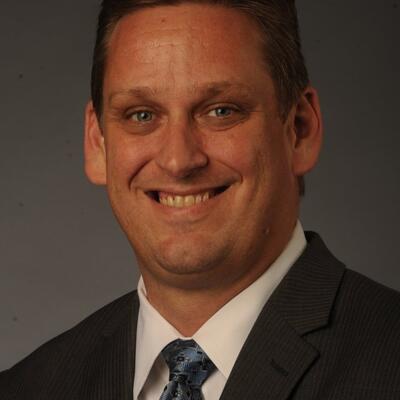
Tony Strickland
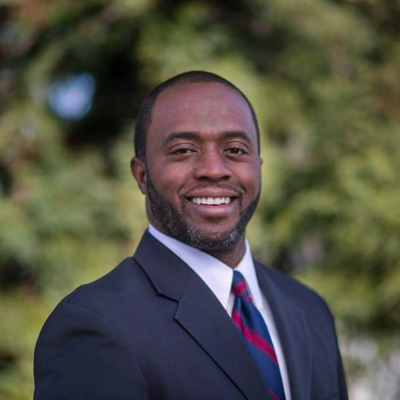
Tony Thurmond
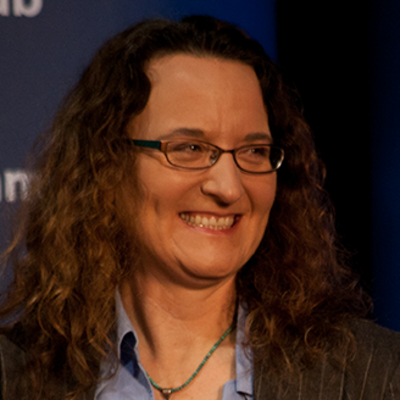
Cassandra Sweet
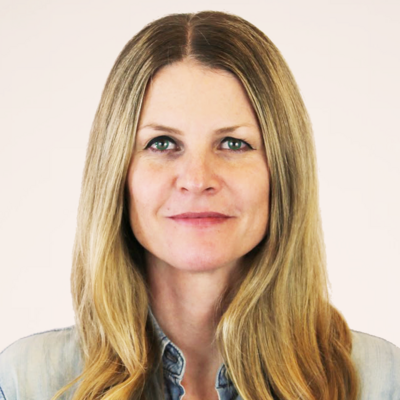
Katie Fehrenbacher
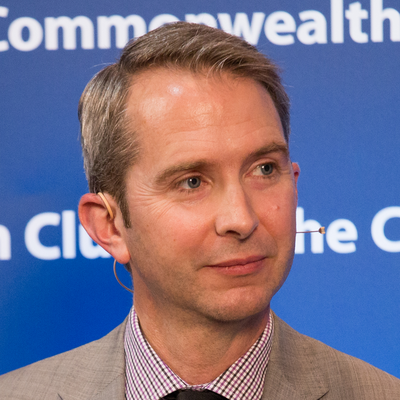
David R. Baker
Summary
2016 began in the afterglow of the Paris climate accord, and ended with the triumph of a presidential candidate who has labeled climate change a hoax. So what will 2017 and the Trump administration mean for the future of clean energy? On today’s show we look ahead at how environmentally-conscious lawmakers and businesses might move forward now that Republicans control the White House and both chambers of Congress, and how big blue California might continue to lead the fight against climate change in spite of what happens in Washington.
Christine Pelosi, Democratic Political Strategist
Duf Sundheim, Former Chair, California Republican Party
Tony Strickland, California Chair, Pro-Trump Super PAC, Committee for American Soverignty
Tony Thurmond, Member, California State Assembly (D)
Cassandra Sweet, Energy Reporter, The Wall Street Journal
Katie Fehrenbacher, Senior Writer, Fortune
David Baker, Energy Reporter, The San Francisco Chronicle
Full Transcript
Announcer: This is Climate One, a conversation about powering America’s future – a future that may take an unexpected turn in our response to climate change.
Trump: I believe strongly in clean water and clean air. But I think it’s a big scam for a lot of people to make a lot of money.
Announcer: What will a President Trump mean for US environmental policy?
Cassandra Sweet: I think the train has left the station in terms of U.S. utilities cutting their greenhouse gas emissions and using more renewable energy. The bigger question is what's gonna happen after that.
Announcer: How will deep-blue California and its progressive climate agenda get along with the new administration?
Tony Thurmond: We have the ability to push back, to protect everything that we've done to work against climate change – to bolster what California can do, and hopefully to be a shining example for the rest of our nation.
Announcer: Political and climate disruption. Up next on Climate One.
Announcer: Climate One is changing the conversation about America’s energy, economy and environment. I’m Devon Strolovitch. Climate One conversations – with oil companies and environmentalists, Republicans and Democrats – are recorded before a live audience and hosted by Greg Dalton.
2016 began fresh from the triumph of the Paris climate accord, but a year later it was the surprise triumph of Donald Trump that dominated the news. It was a roller coaster of a year – and it was also hot. Scientists say 2016 will see the highest average global temperatures ever recorded as long as humans have been walking the Earth. So what will 2017 and the new administration in Washington bring as far as of our commitments to fighting climate change? On today’s show we look ahead at how environmentally-conscious lawmakers and businesses might move forward now that Republicans control the White House and both chambers of Congress.
Joining Greg today are three veteran journalists covering the energy and clean-tech beats. David Baker is energy reporter with the San Francisco Chronicle. Katie Fehrenbacher is a former senior writer at Fortune, and wears the coolest sneakers ever on the Climate One stage. And Cassandra Sweet is an energy reporter with the Wall Street Journal.
Here's Greg talking about the year in political and climate disruption.
Greg Dalton: Cassandra Sweet, the Paris climate accord brought together almost 200 countries getting on the same page. Is it a big deal? Does that matter to businesses that you covered in the Wall Street Journal?
Cassandra Sweet: It is a big deal because there's a lot of global pressure on the United States to do something about its emissions. You know, and we are one of the top energy users in the world and we also emit among the most greenhouse gases. And we’re a rich country so we can afford to use new technology to cut our emissions. So there's a lot of global pressure from China, India, you know, Europe other countries. And there's an expectation among ordinary Americans that our government should do something about climate change and that other governments should be doing something. And now I think we’re also hearing from investors that kind of nameless, faceless group of people who invest in all the big companies that are publicly traded, that we hear about. A lot more investors are becoming concerned about climate change and they’re putting pressure on companies that they invested in to do something. To, you know, have a cleaner operation to cut their emissions, you know, through energy efficiency and other things like that.
Greg Dalton: David Baker, you cover Chevron. Does Paris mean anything for Chevron or other energy companies did you cover or is it some big obstruct UN thing far away that, you know, does not really get to directly affect their business?
David Baker: Well at this point there’s actually quite a split in the oil world between the U.S. oil companies and the European ones. And the European companies have bonded together and European oil companies have bonded together and said, jointly, we need a global price on carbon. We don't care if that comes to cap and trade or a tax, but we need a global price so we can make the decisions over the timeframe that we care about, which for oil companies tends to be somewhere in the 30, 40, 50 year ballpark. They’ve been very forthcoming, very forward about that. Chevron and Exxon, and the American companies don't want to go there. They’re trying to sort of lay low in terms of public statements about it at this point although Exxon has not been able to do that effectively as Chevron. But, you know, I went to Chevron’s annual shareholder meeting in San Ramon this year. And one of their shareholders got up and said, “You know, just keep doing what you're doing. That's all I want you to do.” And the CEO said “Thanks. That’s what we plan on.” And that’s sort of their approach.
Greg Dalton: And the system that's what they're paid to do is make the most money for their shareholders, including a lot of people. If you own an S&P 500 index funds, as a lot of people do, the oil companies are a big part of that, and so we’re part of that. Katie Fehrenbacher, Silicon Valley likes to think that it's far away from policy, Washington DC. The UN is probably even another further way. Does the Paris climate agreement mean anything in Silicon Valley?
Katie Fehrenbacher: Probably not as much compared for the startups, compared to some other bigger energy companies. I mean Silicon Valley is in kind of a new era where they have to pay more attention to policy. You know, there's companies like Uber, Airbnb who are coming up against regulators in different markets. And so I think there is kind of this new trend of startups having to pay attention to greater policy and regulatory issues. But I think in terms of Paris, I don't think there was a great deal of attention paid to Paris in the tech startup community so much.
Greg Dalton: So not startup. Though, Facebook had a big presence there at the end of Le Bourget, I was there in Paris and Facebook with very visible presence. But certainly the smaller companies maybe not so much.
Katie Fehrenbacher: Yeah. Well some of the big Internet companies have made a big push to kind of embrace that for a variety of reasons.
Greg Dalton: I want to talk about the election, Donald Trump was asked by Bill O'Reilly of Fox News about his belief in global warming. Let's hear what he said.
[Start Clip]
Donald Trump: I think that there’ll be little change here. It'll go up, it’ll get a little cooler it’ll get a little warmer like it always has for millions of years. It’ll get cooler, it’ll get warmer. It’s called weather. I do believe in clean and obviously a lot of people don't know this. I've received many environmental awards. Many, many environmental awards for the work I do. And I believe strongly in clean water and clean air, but I don't believe that what they say. I think it's a big scam for a lot of people to make a lot of money.
[End Clip]
Greg Dalton: Donald Trump on Fox News. David Baker, what do we know about his policies and how he can, he clearly favors fossil fuels. How is that gonna play out?
David Baker: Yeah, we still don’t know exactly. I mean, he doesn't always do and say the same things on a particular topic. He had a sit-down meeting with Al Gore to talk about climate change. He told the New York Times editorial board he was keeping an open mind on Paris. But if you look at his transition team, and if you look at some of the names he's floated or settled on for picks for his cabinet, you have a stunning number of climate skeptics, contrarians, deniers, whatever term you want to use. The Attorney General from Oklahoma would be in charge of the EPA. This is the man who has led the states that opposed the clean power plan in suing the EPA. So that doesn't really give me a great feeling about how effective Mr. Gore was in their conversation the other day.
Greg Dalton: Cassandra Sweet, can Donald Trump cancel Paris?
Cassandra Sweet: I think the train has left the station in terms of U.S. utilities cutting their greenhouse gas emissions And using more renewable energy to bring about the emission cuts that are called for under the clean power plan, which is the Obama administration's centerpiece climate policy. And that's a 32 percent reduction by 2030. And the fact is, most utilities they plan very far ahead. They plan 10 or 20 years into the future and they've already made their plans. They've shut down old coal plants, you know, other coal plants that don't make money are gonna get shut down. Electricity demand in the United States is flat or falling in many parts of the country. And we still have a natural gas boom. Natural gas is very cheap, wind power is very cheap. And so the markets are expected to help the United States reach its climate pledge under the Paris agreement. I think the bigger question is what's gonna happen after that. So I think there is an expectation that if Hillary Clinton were elected that she was going to, you know, introduce new mandates past 2030 and tighten restrictions on pollution. And so I think people are not expecting that to happen.
Greg Dalton: Katie Fehrenbacher, you cover Silicon Valley. Electric cars, the mantra in Silicon Valley is don’t invest in any company that’s dependent on policy because you get burned, because you could never trust what the government is gonna do. They’re gonna keep moving forward or you think they might change based on this political?
Katie Fehrenbacher: I think electric cars are definitely coming. I mean you can just look at Tesla, is kind of quintessential Silicon Valley electric car company, you know, pretty successful so far. You know, they had their first profitable quarter in three years, this year. I think everybody is looking at that company as kind of a leader. And then all the big car companies are following suit as well. So I think electric cars are definitely happening but not necessarily having to do with the Paris agreement.
Greg Dalton: Cassandra Sweet, obviously lot of these cars needs juice to power them. There was a time when electric utilities looked at electric cars as like a pain, oh they’re gonna hurt our grid, well, we don’t know what to do with them. Is that still the case?
Cassandra Sweet: Utilities love electric cars. They love electric cars. They’re big cheerleaders for electric cars. And they're seeing them for, you know, more than just an opportunity to sell more electricity which they don't mind. So, you know, here in California we have a 50% renewable energy mandate by 2030. That's a lot of renewable energy to put on the grid. And even now, and I think we’re at 26% there's a lot of solar power that's generated during the day that we can't use in California because we just don't have a place to put it and we don't need it. So utilities are thinking about electric cars to give them more an opportunity to develop more infrastructures in the grid and they always make money off of that. But also the batteries in electric cars, if there are a lot of them, the utilities are looking at them as a storage device where they could just push out excess solar power to whatever cars or, you know, plugged in at the time. And then if that was your car, you get free electricity for it. Right now, the utilities are giving away excess solar power to Arizona or in some cases paying someone to take it. Because it's just too much and we’re gonna have more of it. So I think electrification of transportation is definitely gonna happen in California and other states probably Hawaii, you know other states that have a lot of solar and have these very aggressive renewable energy mandates.
Greg Dalton: David Baker, another auto story was soon as Donald Trump was elected president. The alliance of auto manufacturers said, oh those CAFE standards that’s been rising recently we want to gonna take, you know, back off on those. And those depending on who you talk to were the number one or number two most important things this country has ever done on climate, reducing fuel demand by couple million barrels. And now as soon as there’s a political change, Detroit saying, not so fast. What is the impact of that?
David Baker: That’s a big question mark. But they were gonna be asking for that even if Clinton won the election. They’ve already been escalating the mileage standards over the last few years. And all these by the way in case you didn't know come from California. They were originally codified by State Senator Fran Pavley who is leaving office this month. But the way they set it up, the way the federal government set it up is the standards would ration up slowly for a few years. And then once it got past 2020 they would escalate pretty sharply. And the car companies looking at 2020, which is not far away were saying, okay we don't have enough electric vehicle sales yet to make this work out. Can we get some kind of wiggle room as to when the highest of these standards hit. The thing though is they can't actually back out of it at this point. In part, because they've already been planning their products around this for years to come, but also because the standards, even if Trump just waved a magic wand and eliminated them at the federal level altogether. They would still apply in California because we have special permission from the government to apply our own standards here in the state if they fight air pollution we’ve had that for years. Plus, Canada adopted the exact same standards. So the automakers –
Cassandra Sweet: Several other states did as well. New York, I think Massachusetts it's at least a dozen.
David Baker: Right. So they don't, the automakers may want some breathing room, but they can't actually even ask for really to abolish these standards because then they'd be in the situation making very different cars for markets that are right next door to each other and they hate that idea. So even if the feds give them that wiggle room, they’ll still probably need to come to California and say, okay will you do the same for us?
We’re looking ahead at the big climate stories of 2017 at Climate One. Greg Dalton will continue his conversation in just a moment.
We’re picking up the conversation now about political and climate disruption with David Baker, Energy Reporter at the San Francisco Chronicle. Katie Fehrenbacher, former Senior Writer at Fortune Magazine, and Cassandra Sweet, Reporter at the Wall Street Journal.
Here’s our host Greg Dalton.
Greg Dalton: One of the big stories of 2016 was the Dakota Access pipeline and we’re gonna, which you’ve all heard about protesting the rerouting of a pipeline across the Missouri River across some indigenous lands. After months of organized protest, the U.S. Army Corps of Engineers recently decided to look at a rerouting of that pipeline. Here's a CNN report on the reaction to that decision.
Reporter: Drumbeats, cheers and tears. The sound of victory for the Standing Rock Sioux and thousands of others gathered to stop the Dakota Access pipeline. This massive humanity living off the grid, joined by thousands of military veterans helped exert so much political and legal pressure, effectively forcing the pipeline to be rerouted.
Male Speaker: People have said that, no this is either we make it or break it. And this one, we made it.
Greg Dalton: CNN report of the Dakota Access pipeline. That decision of course could be change in a Trump administration. David Baker, environmentalists cheer when the Keystone XL is killed or delayed. Cheered here where something is rerouted and yet we all live in a fossil fuel world where we rely on that product. Environmentalists don’t like the tankers that bring it in the Bay Area, they don't like the pipelines. They don't like the railcars that might bring it. That oil won’t come to – to get to the Bay Area, but some other oil may come down from Canada. You look at the energy system broadly does stopping one pipeline really change the system?
David Baker: It's easy to say no, that it doesn’t. And yet the fact that Canada's oil sands in northern Alberta are sort of bottled up and haven’t been able to really expand production much in the last few years indicates that altogether, yeah, that effort can actually at least delay things. Many of these pipelines are tied to the oil sands and they're all about Canada trying to move this resource that it has that is landlocked to the coast somehow to get it to the global markets. Where they can, not have to sell just to the U.S. they can have more buyers, sell it to China and why not get a better price, expand more of the production. And the Canadian government, even under Justin Trudeau has hard time giving up this notion that this is gonna be a major economic driver because they don't have many other major economic drivers on the horizon. And yet, you know, if you look at this battle the environmentalists have waged pipeline by pipeline. They really actually have had an effect. It's not just the fact that oil prices are low right now that has kept the oil sands or the tar sands bottled up. It is this pipeline by pipeline fight and stymieing things every step of the way. And you can call it obstructionist, but it actually does appear to be working.
Greg Dalton: Cassandra Sweet, there’s an irony though here that some of that oil coming out of North Dakota is actually light sweet crude that actually burns cleaner. So if you’re gonna burn oil in the Bay Area refinery, don't you want the cleaner stuff rather than the dirty stuff?
Cassandra Sweet: Yeah, it is but there's still that dilemma. I mean people don't want pipelines running through their town, you know, or through their reservation or their, you know, sacred area or under their drinking water. I mean, we've seen this also with natural gas pipelines that are proposed in New England. And, you know, in New England a lot of people want to switch from fuel oil to heat their homes to natural gas, but they can't because there's not enough supply. Even though they're really close to, you know, the oil boom in Pennsylvania, there are not enough pipelines to get the fuel to them. And it’s, you know, cleaner burning and all this other thing. But pipelines in general, people don't like them even though they're safer than oil trains. And then also I think what's really been driving a lot of the, you know, environmental movement, opposing these pipelines is the idea that we should keep it in the ground. And a lot of people believe that you have to take a stand, you know, even if, you know, North Dakota, you know, Bakken light crude is better and cleaner than some of the dirtier crudes. We should still keep it in the ground. So I think that's having an impact.
Greg Dalton: We’re gonna go to our lightning round where we ask series of true or false questions to each of our guests starting with David Baker, true or false. Closing the Diablo Canyon Nuclear Power Plant will cause California to get even more of its power from wind, solar and other renewable sources?
David Baker: Eventually.
Greg Dalton: Cassandra Sweet, true or false. Humanity is doomed because of climate change?
Cassandra Sweet: No.
Greg Dalton: Katie Fehrenbacher –
Cassandra Sweet: False.
Greg Dalton: False. You are more concerned about runaway climate change, then you were three months ago?
Katie Fehrenbacher: True.
Greg Dalton: David Baker, true or false. Oil companies trying to block California's move to cleaner fuels are emboldened by having a fossil fuel champion in the White House?
David Baker: Still to be seen.
Greg Dalton: David Baker, if there are – true or false. If there is a climate change conference anywhere in the world, Jerry Brown will fly to it, shake hands and get people to sign a pledge committing cities and states to reduce their carbon emissions? (0:38:13)
David Baker: Absolutely true.
Greg Dalton: Cassandra Sweet, true or false. Many Wall Street Journal reporters recognize burning fossil fuels is disrupting the climate but they don't dare say it around the water cooler or write it in print?
Cassandra Sweet: I think that used to be true. But I think it's –
Greg Dalton: That’s the Murdoch boys came in there’s little more freedom there?
Cassandra Sweet: We talk about it around the water cooler. It’s hard to get a lot of stuff in prints so.
Greg Dalton: Okay. Katie Fehrenbacher, true or false. Self-driving cars will put many professional drivers out of work adding more fuel to the working-class anger that propelled Donald Trump to the White House?
Katie Fehrenbacher: True, but maybe in like 25 years.
Greg Dalton: Okay. David Baker, true or false. You bring up climate change and clean energy at holiday gatherings with your extended family?
David Baker: True. And it gets dicey.
Greg Dalton: Follow up. And they enjoy talking about such a cheery topic with you?
David Baker: Some true, some many false.
Greg Dalton: Alright. That ends our lightning round. How they do? I think they did pretty well. Let’s give them thanks.
[Applause]
Greg Dalton: Let’s go to our audience questions. Welcome to Climate One.
Male Participant: Hi, my name is Andreas. And my question is it seems that during this election, you know, one of the big drivers particularly from the Rust Belt was around jobs. And as we've been talking about here clean energy is driving job growth at a highest, one of the highest rates across sectors. You know, Tesla was building, manufacturing gigafactories in Reno and Buffalo. So I guess one question is why didn't we hear more about the clean energy job story in the media during this election cycle. And do you think that the clean energy job growth story can help to change the conversation around climate change?
Katie Fehrenbacher: I think we didn't hear a lot about it. I mean in certain circles we did but then in kind of the polar opposites we didn’t hear that story at all. I mean, I think it's the fact that Donald Trump talks a lot about infrastructure and investing in infrastructure and the fact that no, he's not including energy infrastructure in that is a real shame. I think that also the solar and the wind industry, they do have, you know, lobbying arms, but they aren’t as big and well-funded as the fossil fuel industries. So I think those need to grow and tell those important stories more.
Greg Dalton: Let’s go to our next question. Welcome to Climate One.
Male Participant: I worked for EPA for over 30 years and now we got a new boss. And we've had both sides of the fence over the years. But energy has changed quite a bit. So now with natural gas really is, what it’s gonna be and the coal industry not so feasible economically. What do you guys think is gonna happen with all these promises to the coal industry regardless of our pick where just gonna go because natural gas really is readily available.
Greg Dalton: Who’d like to – Cassandra Sweet, could you bring about Duke Energy. It used to be a big coal company, now more on gas.
Cassandra Sweet: That’s right. Duke Energy is switching to gas. They've invested in, you know, gas companies. They’re building gas pipelines. They still have coal but they’re not planning to build any new coal plants. Coal is just gonna continue to decline. It’s gonna continue to decline, especially in Appalachia and probably Illinois as well. I think the Powder River Basin will continue to supply, you know, many of the coal plants that are continuing to operate. But I don't think there's much that Donald Trump can do to bring that industry back.
Announcer: You’re listening to Climate One with Greg Dalton. Greg’s been talking with David Baker, Energy Reporter at the San Francisco Chronicle. Katie Fehrenbacher, former Senior Writer at Fortune Magazine, and Cassandra Sweet, Reporter at the Wall Street Journal.
What happened in 2016 to disrupt your climate or political thinking? Tell us about it.
Our email is climate one at commonwealth club dot org.
Or join us on Twitter. Our handle is at climate one.
We turn now to a conversation about climate policy in the biggest and bluest state in the nation. Republicans no longer hold any statewide offices in California, and Hillary Clinton even carried Orange County, long a hotbed of conservatism. But California is on a collision course with the Trump administration on immigration, trade, the Supreme Court, social issues and fossil fuels. In this part of the show, we explore how California might get along with President Trump, and how the state might continue to lead the fight against climate change in spite of what happens in Washington. Can Republicans and Democrats find common cause on anything in the wake of a historically nasty election campaign?
Joining Greg are a pair of Republicans and a pair of Democrats. Christine Pelosi is a member of the Democratic National Committee and a superdelegate. Her mother, Nancy Pelosi has led the House Democratic Caucus for 14 years. Tony Strickland is a Republican who served 10 years in the California State Legislature, and is the California Chair of a Pro-Trump Super PAC, The Committee for American Sovereignty. Tony Thurmond is a Democratic member of the California State Assembly from Richmond, a city along the San Francisco Bay. And Duf Sundheim is former chair of the California Republican Party and a former member of the Executive Committee of the Republican National Committee.
Here’s our conversation about the future of California in the land of Trump.
Greg Dalton: Duf Sundheim, I wanna start around 2003 when an entertainer who had not ever held political office was elected governor of California. He came in and said he's gonna blow up boxes. Lot of people were shaking their heads. And then the ironic twist, of course here is that he is the new celebrity apprentice. He’s taken Donald Trump’s old job. So what parallels do you see between Arnold Schwarzenegger and Donald Trump?
Duf Sundheim: I think the main thing is that they are not ideological and they are not based on personalities. So what they're in terms of who's around them. So their focus is gonna be on getting things done. For Schwarzenegger, the comparison was the movie. Okay, there is a finished product that we get out there and that we sell. For Trump, it's the realization that there is a product that is built, real estate, a building is built. So I think what you'll see throughout this process, and you've seen within the first three weeks is it's about results. And he is putting on his team people that know how to get things done.
Greg Dalton: And that big ego and big personality, in the case of Schwarzenegger. He had some difficult relations with his own Republican Party. Some people thought he was a party of one and some people think Donald Trump is a party of one.
Duf Sundheim: That's right. I think the people that see him as an ideologue, is wrong. But they are gonna be susceptible to pressures that other politicians would not. I remember one time where Schwarzenegger came up with the big proposal and his daughter opposed it and it got switched that weekend. So, you know, there are unusual factors that come into play as to how decisions are made.
Greg Dalton: People trying to read those Trump kids, right. Where are they and how could they get to daddy. Tony Strickland, is California on a collision course with the Trump administration?
Tony Strickland: No, and in fact, quite the opposite. I think you have leaders in the Republican House Kevin McCarthy being the number two, the majority leader. Jeff Denham is in line to be the transportation infrastructure chair which Donald Trump has now said that there's ways on common ground on some issues and some issues there’s disagreements. That's what happens in the legislative body. But I think Donald Trump's investment in infrastructure I think is gonna be very important. That hopefully on those issues that Republicans and Democrats from California can come together in some of those issues. So I think that it is key that what we can do is work together hopefully as a delegation. Not different than Texas, I mean Texans sticks together a little bit more than we do here in California in terms of fighting for your state. And I think we should do that a little bit more here in the state of California.
Greg Dalton: Christine Pelosi, big fight recently in the Democratic caucus. Your mom won again but one third of Democrats said that they wanted someone else. Is there time for fresh new leadership in the Democratic caucus?
Christine Pelosi: I think there is fresh, new leadership in the Democratic Party. And you see that in the number of people that were appointed or nominated. Yes, my mother Nancy Pelosi won overwhelmingly which was terrific. She said they wanted to win by two thirds, she won by 68%, she knows how to count. And, so I’ve never bet against her ability to count and as one of five children, I know she can see through a head fake. So I take it from personal experience, she knows how to do that. And build coalitions, some of which are will necessarily be transpartisan and a lot of them come from younger members. Eric Swalwell from, close to your neighborhood Tony T, is a young member in his 30s, came to Congress with $100,000 in debt. She put him in charge of the future forms so we could talk about that, that student loan debt, get out of the culture of shame and into the culture of talking about why it is that we have so much crippling student debt. And what that means to people's personal economies and deferred dreams. So you will see fresh, new leadership and a chorus of voices going out and reaching out to the American people.
Greg Dalton: So Tony Thurmond, you're in the state legislature in California. California has a Democratic governor, two-thirds control in both chambers, super-majority. That means they can kind of do what they want. What are California Democrats gonna do with that cherished power in Sacramento?
Tony Thurmond: Well, let’s just say I'm glad I'm in California, right, as we all are. On election night, it was just devastating for everyone. When they said that the website for people who wanted to move to Canada crashed, I was thinking that was probably just the people in California saying that. We have the ability to push back on, you know, if Trump decides to cut funding for Medi-Cal. We have the ability to shore that up through the budget. And having a two-thirds majority gives us the ability to do that. California has led the way in LGBT rights, protecting women's rights, immigration issues, education. And because of what's happened we’re gonna have to continue to lead in all those areas in California. And having the two-thirds majority will give us the vote that we need to protect everything that we've done to work against climate change. What we’ve done with SB-350 to make sure that we move away from oil and use more renewables. We’re gonna need that two-thirds majority to bolster what California can do and hope it would be a shining example for the rest of our nation.
Greg Dalton: Awhile back I interviewed former Secretary of State George Schultz who served as Secretary of Treasury under President Nixon and also Secretary of State under Ronald Reagan.
Here is Secretary Schultz.
[Start Clip]
George Schultz: So I have been creating the EPA and I watched it over the years and it seems to me it has proven itself as a very useful neg to keep after us and we have better cleaner air, cleaner water. You would much rather breathe the air in any American cities than breathe it in Beijing. Thank you EPA.
[End Clip]
Greg Dalton: So that's George Schultz, former Secretary of Treasury under President Nixon and the new cabinet member of President Reagan. Duf Sundheim, thank you EPA, but EPA is in the crosshairs of this new administration.
Duf Sundheim: Well, we don't know how that's gonna play out, but Secretary Schultz is one of my mentors and one of the things -- and he did the Montreal protocol which was critical for fluorocarbons, he's done a lot in terms of providing for a cleaner water and cleaner air, but he has been very critical of the degree of regulation versus innovation. So the question is what can be done by private industry in terms of developing new technologies to address these issues and what is the role of regulation? Clearly he and I both favor regulation, but the question is the balance between providing for the innovation versus the regulation which prohibits the activity.
Greg Dalton: Tony Strickland, there are more Americans now who work in the solar industry that are extracting fossil fuels. As a Republican, do you see promising green tech or is it just that --
Tony Strickland: Absolutely. I voted for the renewable energy standard when I was a legislator in Sacramento. I do believe that we are transitioning into a more green technology. I believe that private enterprises invested a lot of money along with public into newer technologies. But I also think that government sometimes creates regulations where the technology doesn't exist. One of the things that CARB, the California Air Resources Board tried to pass for these crane operators over in my district in Santa Barbara, they went to the hearing, they say, look what you're asking for us to do as a government saying that we have to meet these regulations -- that technology doesn't exist and the answer was, well if we have these regulations then someone will make it. What does that do to the person who is trying to create those jobs? Those cranes that cost $7 to $8 million for those operators had to do a garage sale and send them over to Nevada. I believe there's a responsible way of doing it and I also believe that we can work public and private together. I do believe in the renewable energy standard. I do believe that we can transition California into more of a renewable energy technology and that can be the model for the rest the country. But to say that we’re gonna just flip it around and in such a short time isn’t sensible. It just won't happen. We are making strides. There's no question we’re making strides and we can be the model for the rest of the country.
You're listening to a Climate One conversation about the future of clean energy and climate policy in California. Greg Dalton will be back with his guests in just a moment.
Greg Dalton’s back with his guests. Christine Pelosi, Political Strategist and Democratic Party Superdelegate. Duf Sundheim, former chair of the California Republican Party. Tony Strickland, California Chair of a pro-Trump Super PAC. And Tony Thurmond, Democratic member of the California State Assembly from Richmond.
Here’s Greg.
Greg Dalton: A while back I interviewed Marvin Odum, he is the president of Shell Oil Company, one of the largest oil companies in the world. And here's what he had to say about climate change.
[Start Clip]
Marvin Odum: It's very clear for us as a company and that is that climate change is real, that humans have an enormous impact on that and that it requires some sort of action going forward. So we see it as a big enough issue and a big enough risk to where we need that sort of global framework to then drive this market to somewhere different than it is headed right now.
[End Clip]
Greg Dalton: So that's Marvin Odum, president of Shell Oil Company. I want to roll another clip. This is former CEO of Goldman Sachs, Hank Paulson, Secretary of the Treasury under George W. Bush.
[Start Clip]
Hank Paulson: Climate change poses a massive threat to the world. It's a huge economic risk and like any other major economic risk. And I think this is the biggest economic risk the planet faces. Climate change deserves to be understood and managed as the risk that it is.
Greg Dalton: Duf Sundheim, that’s the former CEO of Goldman Sachs, head of an oil company saying things that very few Republicans will say in America right now. Why is the Republican Party out of step with pillars of its support, Wall Street and energy companies?
Duf Sundheim: Well, I can't speak for other Republicans. I mean, I agree with him, I agree with Steve Schmidt, I agree with Secretary Schultz. It's a major problem and we need to move forward and you have two Republicans on the stage that agree with that statement. So we are within our party just as Tony mentioned there are differences within the Democratic Party, we’re fighting very hard to have those issues addressed. I think the major difference that we have with the two people on the stage is what is the balance. So I was in meetings with Governor Schwarzenegger where the leading energy producers would come in and they’d say, Governor we’re glad to do this, we’re glad to do this, but we’re told if we do do this we’re gonna be sued. And we’re told at the same time by this other agency if we don't do this, we’re going to be sued. So just tell us what we need to do. And that's the type of regulation that we’re talking about. It’s just common sense regulation that addresses this issue because that's the balance we’re trying to strike. And Tony and I have been working hard to find that balance because we do need cleaner air, we do need cleaner water, but at the same time we also have to understand that there are more people living in poverty than there are people in 39 of the 50 states. So we just want to make sure as we make this transition we take into account all those people that are being left out of the American dream.
Greg Dalton: Tony Thurmond, is California's green push hurting poor people, working-class people?
Tony Thurmond: Absolutely not. The jobs in the cleantech sector pay much better than any of the low-paying jobs that often have been offered. And, you know, of course there are some restrictions, but we also have a system like cap and trade that says, look you can either reduce your greenhouse gas emissions or you provide money that’s gonna help offset the impacts to those communities that are negatively impacted environmentally. And so there are opportunities who work with the business community. You know, I authored a bill that was signed by the governor that puts higher fees on companies that have oil and gas leaks. We invited the industry to be at the table and have conversation. So when businesses are responsible and willing to work with us, we can do that. We want to support California businesses but when they’re doing the right thing. And too often the argument from some Republicans and some business leaders is we know it's the right thing to do but it just costs too much money. What we’re saying, what’s the cost to not act. And so we’re happy to have those conversations, we want support California business, but we cannot put our head in the sand and say that climate change is not real or because it costs too much to address it we’re not gonna do anything.
Greg Dalton: Michael Bloomberg, and others, Hank Paulson did a whole project on the cost of inaction. There’s often -- we can’t do something because it will cost too much. So there’s a cost of doing nothing. We’re gonna go to our lightning round, a series of true or false questions for our guests today beginning with Duf Sundheim. True or false, gay marriage is settled law in the United States?
Duf Sundheim: True.
Greg Dalton: Christine Pelosi, Hillary Clinton's campaign showed hubris and entitlement?
Christine Pelosi: True.
Greg Dalton: Tony Strickland, Joe Biden would have beaten Donald Trump in a landslide.
Tony Strickland: True.
Greg Dalton: Tony Thurmond, Ku Klux Klan support for Donald Trump is deeply troubling?
Tony Thurmond: True.
Greg Dalton: Duf Sundheim, the electoral college should be reformed so electoral votes are aligned with popular votes in each state?
Duf Sundheim: Within each state? Because -- so I'm not for the popular vote but I’m for getting rid of the electoral college in going, so California --
Tony Thurmond: Like a congressional district type system, this from other states.
Christine Pelosi: Only if you have universal nonpartisan redistricting commissions.
Tony Strickland: I'm for those two and support of that in California and support it nationwide.
Greg Dalton: And yeah, that’s fine. Actually we found some various agreements there in terms of reforming a and protecting the democracy. Christine Pelosi, the next two years will be your mother's last as the leader of the House Democrats.
Christine Pelosi: False.
Greg Dalton: Tony Strickland --
Tony Strickland: That would’ve been a story if you said otherwise.
[Laughter]
Tony Strickland: That would have been a front page story.
Greg Dalton: You gotta try. Tony Strickland, do you watch MSNBC at least once a week?
Tony Strickland: Absolutely true.
Greg Dalton: Christine Pelosi, you watch Fox News at least once a week.
Christine Pelosi: True.
Greg Dalton: Duf Sundheim, burning fossil fuels contributes to rising seas and temperature.
Duf Sundheim: True.
Greg Dalton: Tony Strickland, carbon pollution contributes to climate change.
Tony Strickland: True.
Greg Dalton: Duf Sundheim, you have slept with a Democrat.
Tony Strickland: Wow.
[Laughter]
Duf Sundheim: She is --
Tony Strickland: Wow.
[Laughter]
Tony Strickland: Just say it’s true.
Duf Sundheim: She does not indicate her -- she is an independent voter.
Greg Dalton: Fair background here. You worked with Arnold Schwarzenegger who used to often talk about how he did that.
Duf Sundheim: You’re trying to get me in trouble here.
Greg Dalton: No.
[Laughter]
Christine Pelosi: Now, that would’ve been a story.
Duf Sundheim: And she is sitting in the second row so.
Christine Pelosi: Hi honey.
Duf Sundheim: That’s funny.
Greg Dalton: Christine Pelosi, you’ve slept with a Republican.
Christine Pelosi: False.
[Laughter]
Tony Strickland: So you’re saying there’s a chance.
[Laughter]
Tony Strickland: I’m kidding. I’m kidding. That’s not a story.
Christine Pelosi: In my next life perhaps.
Tony Strickland: Yeah, yeah exactly.
Christine Pelosi: But I’m happily married.
Greg Dalton: Tony Thurmond, California's drift toward one-party rule is unhealthy for its democracy.
Tony Thurmond: False in the current sense.
[Laughter]
Greg Dalton: Duf Sundheim, Donald Trump is the only elected leader, world leader who publicly doubts that human activity is changing the climate.
Duf Sundheim: Recent comments not clear. I think he is showing that he is open to new ideas in that area.
Christine Pelosi: He is the only one who has tweeted it. Put it that way.
Greg Dalton: That’s -- yeah, the only one who has -- yeah. Tony Strickland, Republicans are afraid to stand up to Trump for fear of reprisals.
Tony Strickland: False.
Greg Dalton: Tony Thurmond, California's climate action has raise energy prices and hurt low income people.
Tony Thurmond: Absolutely false.
Greg Dalton: Duf Sundheim, are more Republican men in the gay closet or the climate closet?
[Laughter]
Duf Sundheim: You got good ones.
Tony Strickland: He’s getting all the good questions.
Duf Sundheim: Well, I think that the gay issue here is pretty much settled. So I would say by default more in the climate.
Greg Dalton: Okay. Christine Pelosi, federal earmarks were useful lubricants for getting deals done in Congress and they should be revived.
Christine Pelosi: False.
Greg Dalton: Tony Thurmond, Democratic politicians should spend less time sipping Chardonnay on verandas with well-heeled donors and more time drinking beer in dive bars.
Tony Thurmond: Well, I don't drink Chardonnay.
[Laughter]
Tony Thurmond: I’m gonna say false.
Greg Dalton: This is -- I would mention a statement and want to ask from each of our guests two or three words, first words that pop into your mind. This is Donald Trump statements. So I’m gonna ask each of our guests, I’ll mention a Donald Trump statement and get their immediate response, the first two or three words that come to their minds. Christine Pelosi, Donald Trump banning lobbyists from his cabinet.
Christine Pelosi: A false promise.
Greg Dalton: Duf Sundheim, breaking with 65 years of bipartisan tradition and appointing a military officer James Mattis as secretary of defense.
Duf Sundheim: Great move. Historic move.
Greg Dalton: Even though it will require a changing federal law because we want to have this a tradition of civilian control the military in this country. Tony Strickland, Donald Trump statement to Billy Bush that he sexually assaults women.
Tony Strickland: False.
Greg Dalton: Tony Thurmond, Donald Trump's plan to have Muslims register.
Tony Thurmond: Shameful behavior that doesn't belong in our country.
Greg Dalton: That’s the end of our lightning round. Let’s give them a round of applause.
[Applause]
Greg Dalton: Let's go to our audience questions. Welcome.
Male Participant: Sure. Thanks. So to Mr. Sundheim. You gave a really eloquent discussion on climate and the nuances between Republicans and Democrats in California. And Mr. Dalton asked you as poignantly as he could the disconnect that I just don't understand. So try and explain it simply, since this is all about communication. Why can't mainstream Republicans from Mitch McConnell, on down just accept climate change. Say exactly what you said, we have a different view of how to get to it. Whether it be regulation, innovation all the things I might add that California has done. And I say this as somebody who worked in Washington in the 80s when acid rain was being debated. Tell me why they are so frightened to even say it.
Greg Dalton: Duf Sundheim.
Duf Sundheim: Yeah, I'm sorry I can't answer that question. Other than that's a discussion that Tony and I have. And I think that we’re making progress in that and I think that again you’re seeing it even in the Trump administration where they started out with, you know, very flat statement and they’re being much more nuanced. So the thing about this administration again if you have the evidence I think you're gonna be able to make your case and that's what we’re gonna continue to try to do.
Greg Dalton: Christine Pelosi, some people say that the answer to that question is partly money, fossil fuel funding. California Democrats recently said they're not going to take money from fossil fuel companies. Is that gonna hurt?
Christine Pelosi: It’s gonna help. I think it's a terrific idea. I wish that our legislators individually wouldn't take that money either. Because I think the worry is not that we’re sliding into one-party rule in California, I think which you’re gonna see in the legislature where you’re gonna have progressive Democrats versus the so-called Mod Squads who are getting money from big business. That's what hurt us some of our climate efforts earlier this year. So yes, it's the money. If you’re the Koch brothers and you have shale oil investments that are with billions and billions of dollars and given even $1 billion in campaign contributions to protect that is a very successful return on investment. And that's why you have to clean up polluted politics by cleaning up the ability for unlimited money to be spent and showered on these legislators.
Greg Dalton: Duf Sundheim.
Duf Sundheim: And I think that's a good answer to the question that you asked. I mean there are people that are tied whether it's coal or oil and they’re tied to those industries and so it's a matter self-interest.
Greg Dalton: Let’s go to our next question. Welcome.
Female Participant: This question is for Tony Strickland, mainly because I disagree with you the most on stage.
[Laughter]
So like many Californians in this room I was shock when Trump won. And how do we as Californians eliminate the enclaves in American society. How do we shake the coastal elite reputation and connect with the rest of the nation?
Greg Dalton: Tony Strickland.
Tony Strickland: Well, you know, I think it’s important to connect with -- we have a diverse country. Look, I was Mitt Romney’s California chair both in ’08 and ’12. I spent a lot of time with Governor Romney traveling this country. People in Texas are far different, they have different life experiences than people in California, than people in Alabama than people in New York. The greatness of this country is we are diverse. And but you have to understand that you have to have a candidate that can fit anywhere else. And let me talk to you what I mean. In my lifetime, I think the two best elected presidents that fit that mold are Bill Clinton and Ronald Reagan. Let me give an example. You could go from Wall Street to Hollywood to the south to the Midwest Union steel town and Bill Clinton and Ronald Reagan would fit in wherever he went. And I don't think that that was the case of the two candidates that we had. But I will say in the swing states in that Rust Belt, Donald Trump was able to connect. And unlike you, I thought Donald Trump had a shot. I thought it was inside straight, but I always thought he had a shot at winning the presidential race. And I knew it came down to flipping a democratic state, but also making sure, Obama won Florida, Virginia and Ohio both times. We had to win, I knew Virginia was gone when we talk about presidential race, but Florida and Ohio I felt very confident that Donald Trump was gonna win those two states. I was saying what other state can he do and campaigning wise, Joe Biden would've done far better in Wisconsin, Michigan and Pennsylvania obviously. And Hillary Clinton just did not connect to those voters in those states.
Greg Dalton: Let’s go to our last audience question. Welcome.
Female Participant: Hi, this question is for Mr. Thurmond. So you mentioned that right now in construction job training that there are solar panel installation trainings as well. And I was just wondering like since as Ms. Pelosi said that people vote either like personal pocketbook and climate change is also an undeniable threat. And so it seems like one of the best solutions is to retrain workers who are currently in the fossil fuel industry to work in cleantech. And my question for you is, what are the biggest roadblocks right now to having more widespread and robust retraining programs. And what can laypeople, like, activists do to like empower their local representatives to get that kind of funding?
Greg Dalton: Thank you. The only time climate came up in the debates was a guy who works at a coal plant.
Tony Thurmond: You know going back to the gridlock in Congress. The federal government has reduced amount of money that we get for our workforce development programs. And those are exactly the dollars that we use to train and retrain individuals. We’ve got a great community college system that really can help to prepare people for, you know, sectors that are really seeing growth, you know. Cleantech is seeing growth, technology. We’ve got to start working with our students while they're in school to make sure that they get access to all the computer science training that they can. We’re gonna see maybe a million jobs in coding that could go unfilled in California because we’re not preparing our students to be that workforce of tomorrow. These things require dollars to provide that training. And quite frankly, we've got to also consider that there are roadblocks in the way of the candidates who often can't get to the training. Whether or not they have been formally incarcerated and there aren’t re-entry programs to help them. Whether or not they’ve struggled in school and they need more support to be prepared to take those jobs. These are the kinds of things that we’re working on in the legislature. We put more money into our community colleges, into our partnership training programs. So that when we have a transportation package that that money can go to creating good paying jobs for individuals who can work in them and have the training and we’re committed to doing more of that here in California.
Greg Dalton has been discussing the year in political and climate disruption with Tony Thurmond, Democratic member of the California State Assembly from Richmond. Tony Strickland, California Chair of the Pro-Trump Super PAC, The Committee for American Sovereignty. Duf Sundheim, former chair of the California Republican Party. And Christine Pelosi, Political Strategist and Democratic Party Superdelegate.
To hear all our Climate One conversations, subscribe to our free podcast at our website: climate one dot org, where you’ll also find photos, video clips and more.
Please join us next time for another Climate One discussion about powering America’s future.
[Applause]
Climate One is the sustainability initiative at The Commonwealth Club of California. Greg Dalton is our Executive Producer and Host. Jane Ann Chien [[Chen]] is the producer. Kelli Pennington directs our audience engagement. The audio engineer is William Blum [[BLOOM]]. I’m Devon Strolovitch, the editor. The Commonwealth Club CEO is Dr. Gloria Duffy.
Climate One is presented in association with KQED Public Radio.
